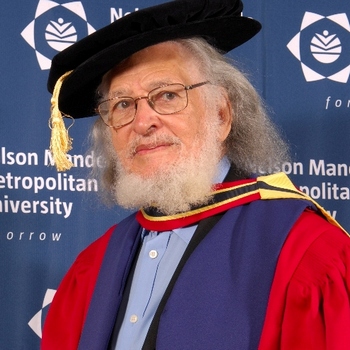DOCTOR OF LITERATURE (HONORIS CAUSA)
 Dennis Vincent Brutus, acclaimed poet and anti-apartheid activist, was born from South African parents on 28 November 1924 in Salisbury, Rhodesia (now Harare, Zimbabwe). His teacher parents later moved to Port Elizabeth where Brutus grew up in the district of Dowerville and received his secondary schooling. Brutus pursued his tertiary studies at the University of Fort Hare, obtaining his BA cum laude in 1947, and later studied towards a law degree through the University of the Witwatersrand. He taught English and Afrikaans in schools around the Eastern Cape for a period of 14 years.
Dennis Vincent Brutus, acclaimed poet and anti-apartheid activist, was born from South African parents on 28 November 1924 in Salisbury, Rhodesia (now Harare, Zimbabwe). His teacher parents later moved to Port Elizabeth where Brutus grew up in the district of Dowerville and received his secondary schooling. Brutus pursued his tertiary studies at the University of Fort Hare, obtaining his BA cum laude in 1947, and later studied towards a law degree through the University of the Witwatersrand. He taught English and Afrikaans in schools around the Eastern Cape for a period of 14 years.
Dennis Brutus began writing poetry while at high school, publishing many of his works in the local student paper, The Pattersonian Spectator, which he helped to establish. He continued to write throughout his teaching career and his poetry's shifts in tenor mark his growing political angst during the 1950's and 1960's. Brutus took the fore in the struggle against racism in sport at this time and was elected president of the South African Non-racial Olympic Committee (SANROC), which struggled for racial equality and fairness in South African sport. As a direct result of their efforts, South Africa was first suspended from the Olympics and eventually expelled from the games in 1970. Brutus was also an active member of the AntiColoured Affairs Department, an organisation that protested and worked against the government's formation of the Coloured Affairs Department.
As a result of his political activism and struggle for human rights, Dennis Brutus was arrested in 1963 and sentenced to 18 months of hard labour on Robben Island -a term which he completed alongside other political prisoners such as Nelson Mandela, Govan Mbeki and Walter Sisulu. While in prison, his first poetry collection, Sirens, Knuckles & Boots (1962) was published, followed by Letters to Martha & Other Poems from a South African Prison (1968), and A Simple Lust (1973) -three of the twelve collections of poetry and anthologies which he published during his life. Upon his release from prison in 1966, the poet-activist Brutus was categorised as persona non grata and banned under the Suppression of Communism Act. Having been barred from teaching, writing, publishing or attending meetings, or of continuing his studies at the University of the Witwatersrand, he left his fatherland in the same year.
After a short period in England he settled in the United States of America as a political refugee in 1983. Focusing on issues of identity and belonging his poetry drew the attention of international readers to the apartheid situation in South Africa. Brutus was visiting professor at the University of Colorado, Boulder and taught English at the University of Denver before becoming Professor of African Literature at Northwestern University, Illinois in 1971.
After his unbanning in 1990 he started visiting South Africa as professor emeritus of the Department of Africana Studies at the University of Pittsburgh. He is currently based at the University of KwaZulu-Natal, where he is an active member of the writing community and still engaged in 'speaking truth to power.' Prof Dennis Brutus continues to work with various NGO's in his constant efforts to aid the struggle for human rights. He specifically concerns himself with the effects of globalisation and the social, economic and environmental impacts of the International Monetary Fund and World Bank policies on Third World countries.
In recognition of his stature as pre-eminent South African poet and for his political activism, Dennis Brutus has received many awards, including the Langston Hughes Award in 1987 (the first nonAfrican American recipient), the Paul Robeson Award in 1989 and the 2005 Fonlon-Nichols Award.
In recognition of his contributions to South African letters and to human rights, democracy and justice, it is an honour for NMMU to confer the degree of Doctor of Literature (Honoris Causa) on DENNIS VINCENT BRUTUS.